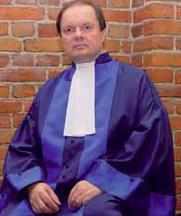The eighteen judges of the International Criminal Court (ICC) are elected for nine-year terms by the member-countries of the court. [1] Candidates must be nationals of those countries and they must "possess the qualifications required in their respective States for appointment to the highest judicial offices". [1]
Contents
- Qualifications, election and terms
- Elections
- Disqualification and removal from office
- Presidency
- Judicial divisions
- Current structure
- Judges
- Chambers
- Former judges
- Classes of judges
- Notes and references

A judge may be disqualified from "any case in which his or her impartiality might reasonably be doubted on any ground", [2] and a judge may be removed from office if found "to have committed serious misconduct or a serious breach of his or her duties" or is unable to exercise his or her functions. [3]
The judges are organized into three divisions: the Pre-Trial Division, Trial Division, and Appeals Division. [4]


